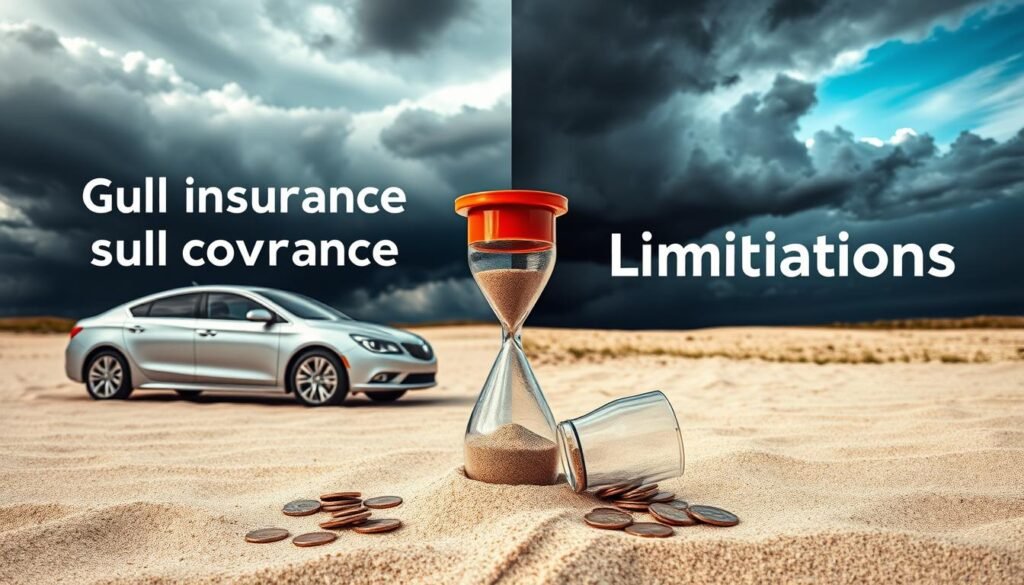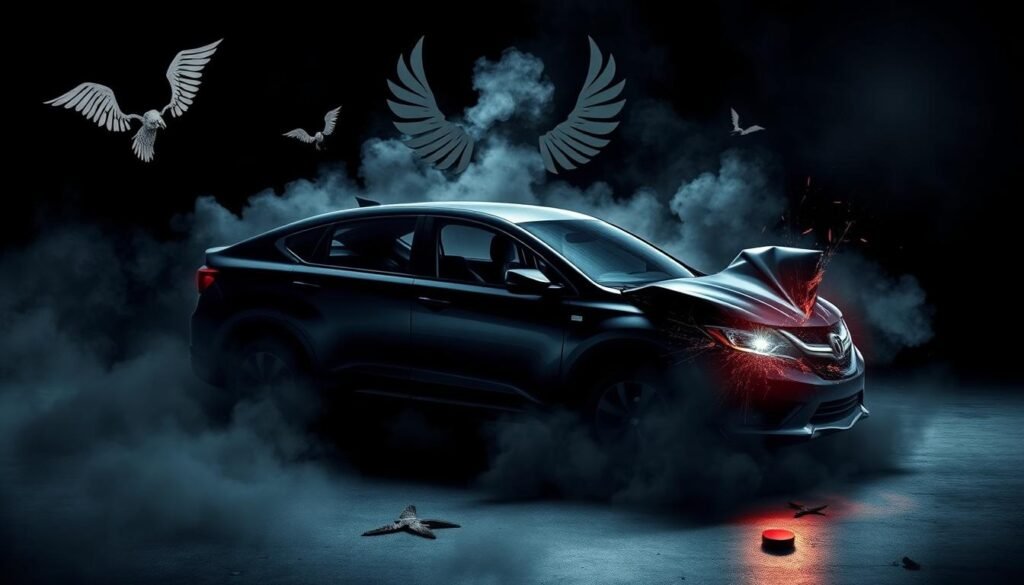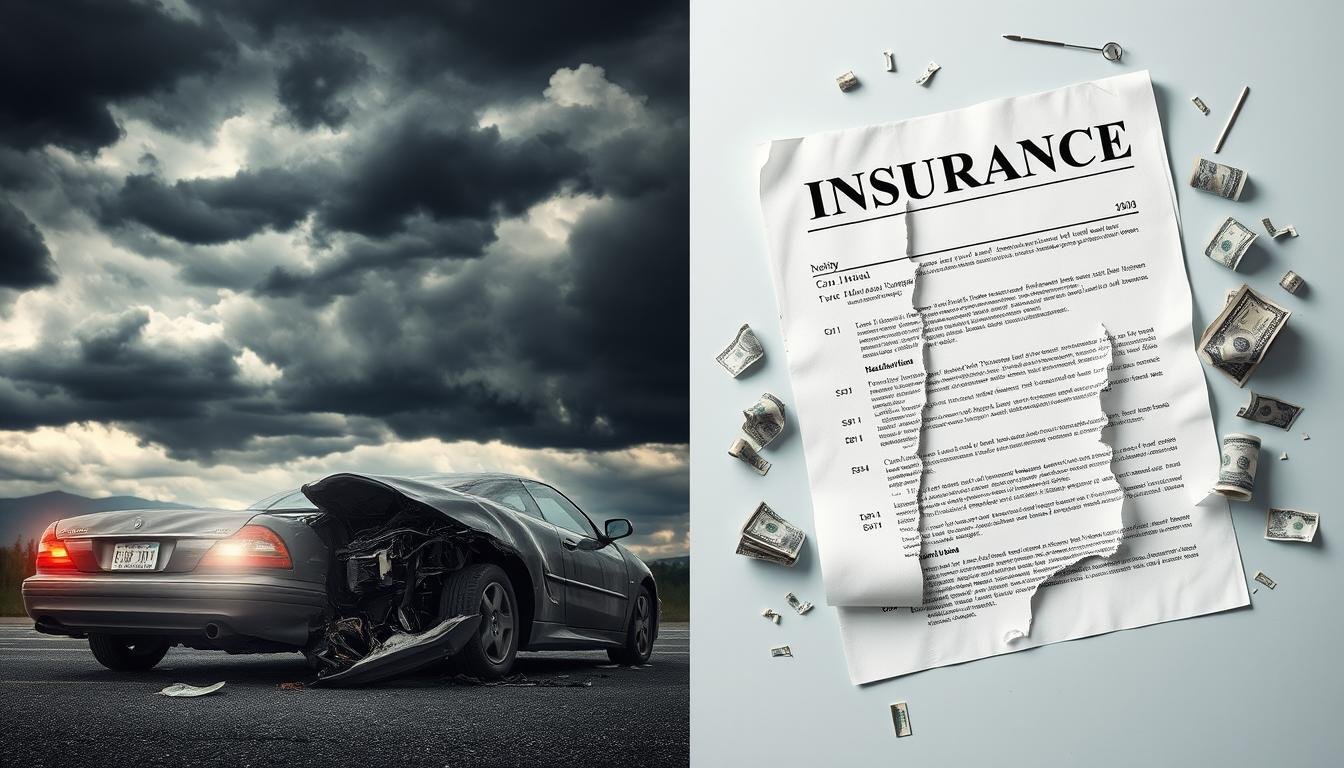Imagine your car gets totaled in an accident, leaving you with a big loan to pay off. That’s where gap insurance helps by covering the extra cost. But, what if you find out your gap insurance won’t pay when you need it? It’s a scary thought. Knowing when gap insurance might not cover you is key to making sure you’re safe.
Key Takeaways
- Gap insurance has limits and exclusions, like not paying if you missed payments or if the accident wasn’t a total loss. It also won’t cover extra features or add-ons.
- Depreciation, being repossessed, or owing money from past loans can make gap insurance not work.
- Gap insurance won’t pay if the damage was done on purpose, if you lied, or if you broke the law.
- It’s important to read your gap insurance policy carefully to know you’re really covered in case of a total loss.
- Things like how much you owe on your loan, your loan agreement, and what insurance you already have can affect how useful gap insurance is for you.
What is Gap Insurance and Why Is It Important?
Gap insurance, also known as Guaranteed Asset Protection (GAP) insurance, is an extra coverage. It’s for those with vehicle leases or financing. When a car loses value fast, its market value might be less than the loan balance. Gap insurance covers this “gap.” It protects you from paying the loan balance if your car gets totaled or stolen.
Many cars lose 20% or more in value in the first year. Most new car buyers need gap coverage for the first three years. Adding gap insurance to your car insurance costs about $40 to $60 a year.
| Gap Insurance Coverage | Gap Insurance Benefits |
|---|---|
| Covers the difference between your car’s actual cash value and the remaining balance on your auto loan or lease if the vehicle is totaled or stolen. |
|
Gap insurance is key for those who owe more on their car loan than the car’s value. It covers the gap, saving you from a big financial hit if your car is totaled.
“Gap insurance is typically required until the remainder of the loan is less than the value of the vehicle, usually in the first few years of the loan.”
When Does Gap Insurance Not Pay?
Gap insurance helps cover the cost of a new car if your old one gets totaled. But, it has limits and things it won’t cover. Knowing these can help you understand when it won’t pay out, leaving you with a loan or lease balance.
Missed or Late Loan Payments
If you’re late with your car loan payments, gap insurance won’t help with extra fees. It’s meant to cover the gap between your car’s value and your loan balance. But, it won’t pay for your own payment mistakes.
Non-Total Loss Accidents
Gap insurance kicks in only if your car is totally wrecked. If it’s just damaged but still usable, you won’t get coverage. Even if fixing it costs more than your car’s value.
Gap Insurance Exclusions: Add-Ons and Extras
- Gap insurance doesn’t cover extra costs like extended warranties or accessories.
- It only pays the difference between your car’s value and your loan or lease balance. It doesn’t include financed extras.
Knowing what gap insurance doesn’t cover is key to making smart choices. It helps you decide if it’s worth it for your car and money situation.

| Scenario | Gap Insurance Coverage |
|---|---|
| Missed or Late Loan Payments | No coverage for fines, fees, or penalties |
| Non-Total Loss Accidents | No coverage if car is not a total loss |
| Exclusions: Add-Ons and Extras | No coverage for extended warranties, service contracts, or aftermarket accessories |
Knowing these limits and exclusions helps you decide if gap insurance is right for you and your car.
Gap Insurance Not Paying Due to Other Factors
Gap insurance helps you avoid the cost of vehicle depreciation. But, there are things that can limit or stop it from working. Knowing these can help you get the best from your gap insurance.
Gap Insurance Not Paying Off Loan Due to Depreciation
Depreciation is a big reason gap insurance might not cover your loan. If your car loses value faster than the insurance covers, you could still owe money. This means you might have to pay the rest of the loan even after insurance pays out.
Situations Where Gap Insurance Won’t Pay Due to Repossession
If your car gets repossessed because you missed payments, gap insurance won’t help. It’s meant to pay the difference between your car’s value and the loan. But, it doesn’t work if your car gets repossessed.
Negative Equity from Previous Loans
Negative equity from a past car loan can also affect gap insurance. If you owed money on a past car that was added to your new loan, gap insurance might not cover that part. This means you could still owe money not covered by insurance.
To make sure gap insurance works for you, keep up with your loan payments. Watch how your car’s value changes. And know what your policy can and can’t do. This way, you can protect yourself from the risks of owning a car.

Intentional Damage, Fraud, or Illegal Activities
Gap insurance has some exclusions you should know about. One big one is that it won’t cover damage from intentional damage, fraud, or illegal activities. If you damage your car on purpose, fake an accident, or commit fraud, your gap insurance won’t help. It also won’t cover damage or theft if you’re doing something illegal, like driving under the influence.
Insurance fraud is a big problem, costing billions of dollars each year. It costs businesses and families a lot of money. The Coalition Against Insurance Fraud says it costs about $308.6 billion a year. The FBI says it adds up to $400 to $700 per family in extra costs.
Life insurance, Medicare, property and casualty insurance, health insurance, and workers’ compensation are often targeted by fraud.
- Intentional criminal acts are generally excluded from liability insurance coverage.
- Insurance contracts in New York may not be written to insure a person for their intentional criminal acts.
- Public policy precludes indemnifying an insured for intentionally inflicted injuries.
Insurers are fighting fraud with new technology. Almost all companies use some kind of anti-fraud tech. But, watch out for fake insurance companies. They might be too pushy, offer prices that seem too good, or make it hard to check if they’re real.
Gap insurance is meant to protect you after an accident or theft, not for intentional damage or fraud. Make sure you know what your policy doesn’t cover to stay safe.

Is Gap Insurance Worth It?
Deciding if gap insurance is a good buy involves looking at a few important things. The loan-to-value ratio is key. It’s the amount you owe on your car versus its real value. If you owe more, gap insurance can protect you from big losses.
Also, think about your finance agreement terms and how fast your car loses value. Longer finance deals and quick car depreciation mean you might want gap insurance more.
Checking your existing insurance coverage is also smart. If your current policy already covers gaps, you might not need more. But if you owe more on your car than it’s worth, gap insurance can be a big help.
New cars can lose up to 20% of their value in the first year. Gap insurance, which adds about 5-6% to your regular car insurance, can help with this loss. At Best Reward, GAP Plus Coverage is under $400, making it a good deal for many drivers.
So, is gap insurance a good idea for you? It depends on your loan-to-value ratio, finance agreement terms, vehicle depreciation rate, and existing insurance coverage. Think about these things to decide if gap insurance is right for you.
| Factors to Consider for Gap Insurance | Impact on Gap Insurance Worthiness |
|---|---|
| Loan-to-Value Ratio | The higher the ratio, the more valuable gap insurance becomes. |
| Finance Agreement Terms | Longer loan terms increase the need for gap insurance. |
| Vehicle Depreciation Rate | Faster depreciation rates make gap insurance more beneficial. |
| Existing Insurance Coverage | If your policy already provides gap protection, additional coverage may not be necessary. |
“Gap insurance is worth the money when you owe more on your car loan or lease than the car is worth due to factors such as a small down payment, long loan term, or rapid depreciation.”
Conclusion
Gap insurance coverage can be a big help, but you need to know its limits. It won’t cover everything. Things like missed payments, non-total loss accidents, and damage from add-ons are not covered.
Also, it won’t cover cars that are repossessed or damaged on purpose. And, it won’t help with depreciation or if you’re caught in a fraud situation.
Knowing what gap insurance doesn’t cover is key. This way, you can decide if it’s right for you. Always read the policy details carefully to avoid surprises.
Gap insurance can protect you, but you must understand what it does and doesn’t cover. With the right knowledge, you can feel safe and ready for anything.
FAQ
When does gap insurance not pay?
Gap insurance won’t cover missed or late payments. It also doesn’t cover non-total loss accidents. It excludes add-ons and extras, depreciation issues, repossession, and damage from fraud.
What is gap insurance and why is it important?
Gap insurance, or Guaranteed Asset Protection, covers the loan balance difference if your car is totaled. It’s key for those with leases or loans. This happens because cars lose value fast, leaving you owing more than the car’s worth.
What are some reasons gap insurance may not pay?
It won’t pay for missed payments or non-total loss accidents. It doesn’t cover extra costs like warranties or accessories. It also doesn’t cover depreciation, repossession, or negative equity from past loans.
How can gap insurance be limited by depreciation, repossession, and negative equity?
Depreciation can mean you still owe more than your car’s value. If you miss payments and your car gets repossessed, gap insurance won’t help. If you have negative equity from a past loan, gap insurance might not cover that part of the debt.
When will gap insurance not provide coverage due to intentional damage, fraud, or illegal activities?
Gap insurance won’t cover damage from intentional acts, fraud, or illegal driving. If you damage your car on purpose or stage an accident, you won’t get coverage. It also won’t cover damage or theft if you’re doing something illegal, like driving drunk.
Is gap insurance worth it, and what factors should I consider?
Whether gap insurance is good for you depends on several things. Look at your loan-to-value ratio, finance agreement, how fast your car depreciates, and your current insurance. The longer your finance agreement and the quicker your car loses value, the more you might need gap insurance.
